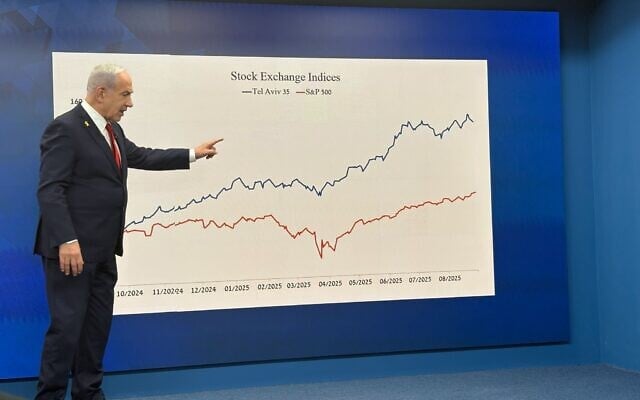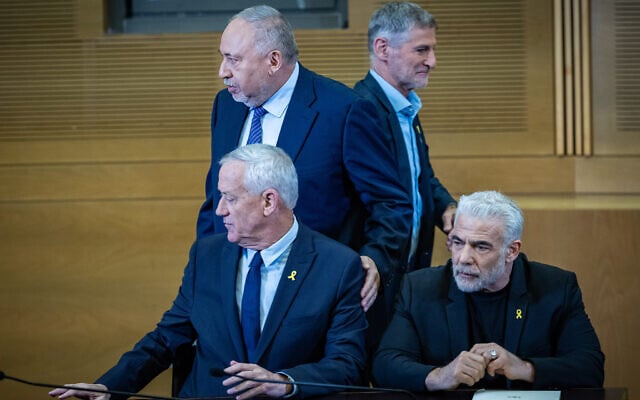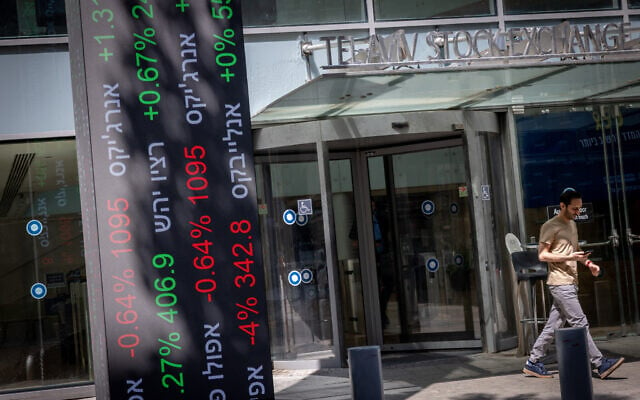NepalIsrael.com auto goggle feed
Prime Minister Benjamin Netanyahu pushed back against fierce criticism from opposition heads and business leaders on Tuesday, a day after he admitted that Israel was facing increasing isolation and warned that it might be required to become a “super-Sparta.”
“Israel is in a sort of isolation,” Netanyahu said Monday, at a conference of the Finance Ministry’s accountant general in Jerusalem.
“We will increasingly need to adapt to an economy with autarkic characteristics,” he continued, calling the term for economic self-sufficiency, closed off from global trade, “the word I most hate.”
“I am a believer in the free market, but we may find ourselves in a situation where our arms industries are blocked. We will need to develop arms industries here — not only research and development, but also the ability to produce what we need,” he said.
Faced with a scenario of “Athens and Sparta,” Israel would be “Athens and super-Sparta,” Netanyahu said, citing the ancient Greek city-state, whose superiority over Greece was effectively ended in the 4th century BCE. “There’s no choice; in the coming years, at least, we will have to deal with these attempts to isolate us.”
Those initial comments, delivered as European countries have gradually increased arms embargoes and sanctions against Israel over the ongoing war in Gaza, caused an immediate dip in stock market shares and led political opponents and high-tech industry groups to blame him for Israel’s troubled status on the world stage.
Yet at a press conference intended to reduce the damage on Tuesday evening, the premier insisted that the negative reaction from the markets was simply a “misunderstanding” and that in reality, the shekel was stronger than it had been before the war with Hamas, which is now approaching the two-year mark.
Israel’s economy, Netanyahu declared, has “amazed the entire world in the past two years while we’ve been at war.”
Insisting that he has “full confidence” in the economy, the prime minister also said that the stock market was performing at record levels, unemployment was at a historic low, and housing prices were dropping.
He said there had also been a large influx of foreign investment into Israel recently.

Prime Minister Benjamin Netanyahu speaks at a press conference on September 16, 2025. (Lazar Berman/The Times of Israel)
Netanyahu conceded, however, that there were indeed efforts to isolate Israel, but that these were politically motivated and not economic.
“I don’t dismiss the attempts to restrict us economically — we are aware of them. It’s possible there will be such attempts. But the world wants the products that Israel produces,” he said.
Responding to Netanyahu’s remarks on Monday, Opposition Leader Yair Lapid demanded to know what the premier had meant by saying that Israel was “becoming” isolated.
Did some higher power cause this?” Lapid asked in a speech at the International Institute for Counter-Terrorism. “You caused this.”
“You are the main cause of the diplomatic isolation,” he charged, citing Netanyahu’s silence when Israel faced negative international press after far-right ministers made comments suggesting an atomic bomb should be dropped on Gaza and that it may be justified to starve the Strip’s residents.
The Democrats chairman Yair Golan fumed on X that Netanyahu was offering “neither security nor economy, but an autarkic economy cut off from the world, under a stifling international boycott. The meaning is simple: a 40% drop in the wages of everyone in the economy.”
“An economy without imports and exports, without high-tech, without advanced industry. A backward country that can barely provide eggs, milk, and water to its citizens,” he wrote.
Yisrael Beytenu chair Avigdor Liberman, a former finance minister, accused Netanyahu of turning Israel into a “third world country.”

Head of The Democrats party Yair Golan, head of National Unity party Benny Gantz, head of Yesh Atid party Yair Lapid and head of Yisrael Beytenu party Avigdor Liberman hold a joint press conference at the Knesset in Jerusalem, November 6, 2024. (Yonatan Sindel/Flash90)
“The prime minister of October 7 wants Israel to get used to isolation, to a closed market, without competition and without oxygen for the economy. This is not a work plan; this is surrender. This is an admission of failure,” he wrote.
Sources close to Netanyahu told the Kan public broadcaster on Tuesday morning that the remark was a “slip of the tongue,” and that he intended to refer to the need for Israel to be reliant on its own defense industry.
At his press conference on Tuesday evening, the premier sought to push back against accusations that he is turning Israel into an autarkic economy by clarifying that his remarks had been focused only on the defense industry, rather than the broader economy.
“There is one area I referred to where indeed there could be restrictions – not economic ones, but political at their core – and that’s what’s happening in the defense industries,” he explained.
“Our defense industries are soaring. They have reached tremendous achievements in exports, both in quantity and quality, but there we have indeed encountered — and could again encounter — political restrictions during the war,” he said.
“And if there is one lesson we have drawn from this war, it’s that we want to be in a situation where we are not restricted — that Israel defends itself with its own forces and with its own weapons. And that is why we want to achieve security independence.”
“My remarks were on the attempt to restrict the import of parts, components, weapons, or raw materials — and that indeed is something that does not operate according to market economics, but according to political economics —governments, leaders, politics,” he asserted.
He claimed, as he had done the previous day, that “Islamic minorities” were to blame for putting increased pressure on “Western European governments,” resulting in souring ties with Israel.
Decades of organized anti-Israel propaganda, he said, have compounded the pressure, which “expresses itself as restrictions on parts of weapon systems or the systems themselves.”
Israel must “develop these ourselves, arm ourselves, and ensure we have the ability to defend ourselves,” even if that requires moving temporarily to “a centralized, closed economy, something I generally dislike — I prefer open markets.”
“But here, I want to take all the necessary steps to build a strong, independent defense industry. If there is one lesson from this war, this is it,” he said.
Netanyahu claimed that just the day before, he had spoken with “people from the Finance Ministry, with farmers, and with others,” and had appealed for them not to “restrict” Israel’s economy with bureaucracy.
“We are leaping forward, both in new technology and in production on a much more industrial scale. And to do this, I need to cut the bureaucracy that restricts us from doing these things…and that’s what I was referring to,” he said.
In the wake of his comments, as well as the beginning of the IDF’s Gaza City offensive, shares on the Tel Aviv Stock Exchange dipped Tuesday, with the benchmark TA-125 index dropping 1.8 percent.
The TA-35 index of blue-chip companies fell 1.6%, while the TA-90 index, which tracked the shares with the highest capitalization not included in the TA-35 index, declined 2.3%. The TA-Insurance index dived 2.9%.
“The start of the Gaza City offensive is a disappointment to investors after expectations for a potential ceasefire fueled Tel Aviv stock indexes to record highs in August,” Leader Capital Markets chief economist Jonathan Katz told The Times of Israel. “The offensive means that war costs will continue, spending will need to be increased, and the budget deficit will be higher, which is negative for Israel’s credit rating.”
“The negative sentiment is also impacted by Netanyahu’s comments about Israel facing the threat of isolation and the need to be self-reliant, which in turn, has potential implications for higher fiscal spending into the defense industry,” Katz added.
Appearing to push back against the criticism and shake off the dip in the stock market, Netanyahu insisted to the press that there had been a “misunderstanding that supposedly shook the stock market.”
“It didn’t shake us,” he insisted. “And the reason it didn’t shake us is one thing: because essentially, the stock market — the markets — understand what I said, the strength of Israel’s economy, and the profitability of investing in Israel. And this is very important for ensuring our future.”
The Israel Business Forum, which represents most private sector workers from 200 of the country’s largest companies, warned Netanyahu earlier in the day that his policies were leading the country into a “dangerous and unprecedented economic and political downturn.”
“We are not Sparta — this vision as presented will make it difficult for us to survive in an evolving global world,” the forum cautioned. “We are marching toward a political, economic, and social abyss that will endanger our existence in Israel.”
“The Israeli economy shows exceptional resilience, despite the security and political challenges — but not forever,” the forum added.
The forum urged Netanyahu to “stop this” policy and called on the government to immediately change course.
“The government must urgently put an end to the longest war in Israel’s history, promote the release of all hostages, announce a state investigation committee [into the Hamas-led October 7, 2023, attack], and set a date for elections in the immediate future,” the forum demanded.
Times of Israel staff contributed to this report
The post”Under fire, Netanyahu scrambles to explain claim Israel may become ‘super Sparta'” is auto generated by Nepalisrael.com’s Auto feed for the information purpose. [/gpt3]





